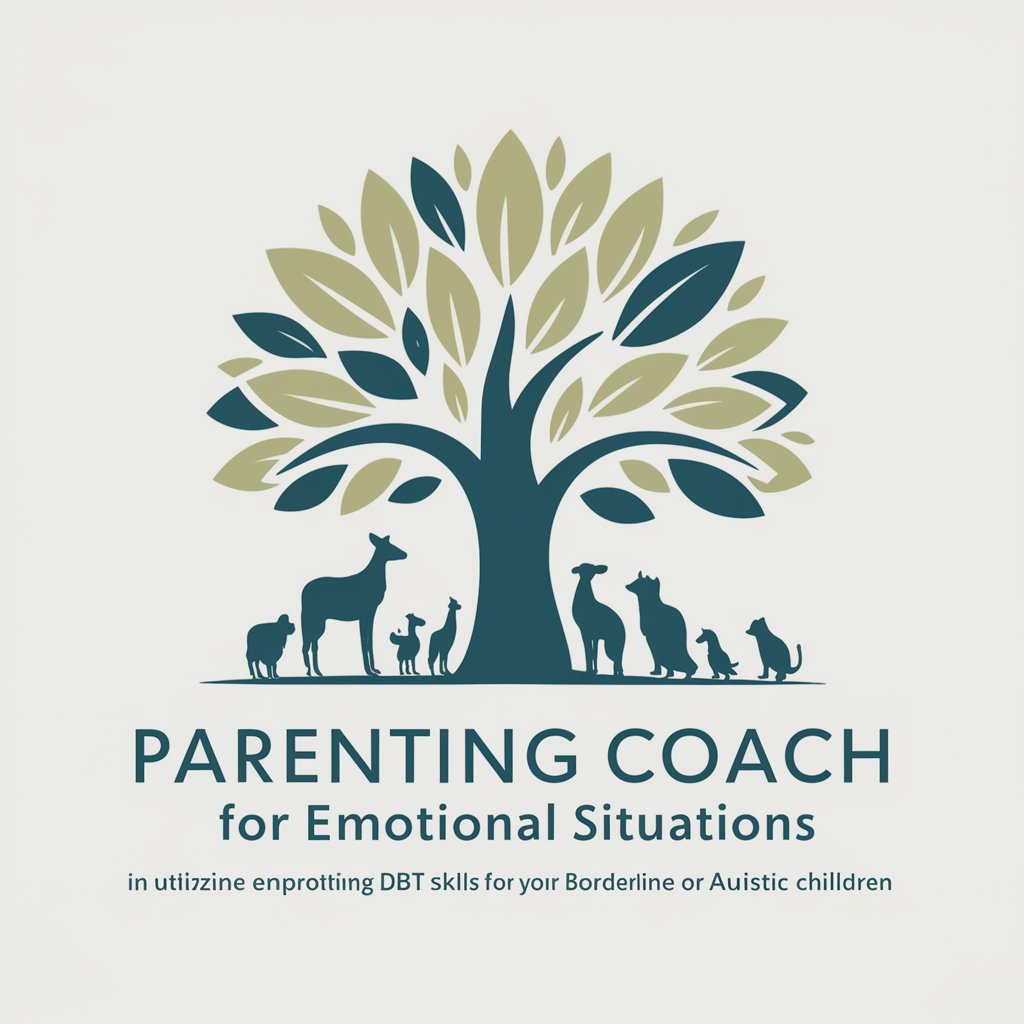Parenting Coach for Emotional Situations - DBT Advice for Parents

Welcome! I'm here to help you support your child's emotional well-being using DBT skills.
Empowering parents with AI-driven DBT strategies.
How can I validate my child's emotions when they are having a meltdown?
What are some effective mindfulness techniques for parents to stay present during challenging moments?
Can you explain how to use emotion regulation skills to handle my own stress as a parent?
What are some practical DBT strategies for managing my child's impulsive behaviors?
Get Embed Code
Overview of Parenting Coach for Emotional Situations
The Parenting Coach for Emotional Situations is a specialized guidance tool designed to support parents in navigating the complex emotional landscapes of their children, particularly those with borderline personality traits or on the autism spectrum. This tool leverages the principles of Dialectical Behavior Therapy (DBT) to offer strategies and insights aimed at fostering emotional regulation, effective communication, and positive behavioral management. By emphasizing skills such as validation, mindfulness, and dialectical thinking, the coach aims to enhance the parenting experience, facilitating a nurturing and understanding environment for both parents and children. Examples of scenarios where this coach proves invaluable include managing a child's intense emotional outburst with empathy and composure, teaching a child to cope with anxiety through mindfulness techniques, and resolving family conflicts through effective communication and problem-solving strategies. Powered by ChatGPT-4o。

Core Functions of Parenting Coach for Emotional Situations
Validation Techniques
Example
Teaching parents to acknowledge and empathize with their child's feelings without judgment, which can help the child feel understood and supported.
Scenario
When a child with autism is overwhelmed by sensory inputs and reacts strongly, parents can use validation to acknowledge the child's discomfort and work together to find a calming solution.
Mindfulness Training
Example
Guiding parents in practicing mindfulness to remain present and composed, thereby improving their responses to challenging situations.
Scenario
A parent learns to take a mindful moment to breathe and stay grounded when their borderline child experiences a rapid mood change, enabling a more measured and supportive response.
Emotion Regulation Strategies
Example
Assisting parents in identifying and managing their own emotional responses to effectively model emotional regulation for their children.
Scenario
Parents use emotion regulation techniques to manage their frustration when dealing with repetitive questioning from their autistic child, leading to a calm and patient interaction.
Interpersonal Effectiveness Skills
Example
Enhancing communication skills to foster clearer and more empathetic interactions between parents and their children.
Scenario
A parent learns to assertively communicate their needs while respecting their child's perspective during a disagreement, promoting a mutual understanding and resolution.
Crisis Management Strategies
Example
Equipping parents with the tools to safely navigate and de-escalate situations where their child may be in emotional distress or crisis.
Scenario
In a moment of crisis when a child threatens self-harm, the parent utilizes a DBT-informed approach to ensure safety and communicate support, helping to diffuse the situation.
Ideal Users of Parenting Coach for Emotional Situations
Parents of Children with Emotional Dysregulation
This includes parents managing children who experience intense emotions beyond the typical developmental scope, such as those with borderline personality traits. These parents benefit from learning specific skills in emotion regulation, validation, and crisis management to support their child's emotional needs effectively.
Parents of Autistic Children
Families with autistic children can face unique communication and behavioral challenges. The coaching services provide strategies for understanding and responding to the child's needs, employing mindfulness, and improving interpersonal effectiveness to enhance the parent-child relationship and manage sensory sensitivities or social communication difficulties.
Parents Seeking Enhanced Communication Skills
Any parent aiming to improve their relationship with their child through better communication and problem-solving strategies will find value in the coaching. Learning to apply DBT principles such as dialectical thinking and validation can significantly improve family dynamics and reduce conflicts.

How to Use Parenting Coach for Emotional Situations
1
Visit yeschat.ai to access a free trial instantly, no sign-up or ChatGPT Plus required.
2
Select the 'Parenting Coach for Emotional Situations' option from the menu to start your session.
3
Prepare a brief description of the emotional situation or challenge you are facing with your child.
4
Interact with the AI by asking specific questions or describing your parenting dilemma to receive tailored advice.
5
Apply the provided DBT-based strategies and tips in your parenting approach and observe the outcomes, adjusting as necessary.
Try other advanced and practical GPTs
ChatGPRizz
Empowering Conversations with AI

Blender Mentor
Empowering artists with AI-driven 3D creativity.

Lecture 20: Instruments for Charged Particles
Decoding the invisible, powerfully.

Co-parent Communicator
Redefining Co-parent Communication

Chef's Companion
AI-Powered Culinary Mastery at Your Fingertips

Stardew Shepherd
AI-Powered Stardew Valley Farming Wisdom

nyc rec fren
Savor NYC with AI-Driven Dining Tips

REC Expert Advisor | Retail Energy Code
Streamlining energy compliance with AI

REC-translator
Transform Data with AI-powered REC-translator

Sneaker Rec
Tailored Sneaker Recommendations, Powered by AI

Book Rec Expert
Discover Your Next Read with AI

RoomGPT
Crafting Virtual Experiences with AI

FAQs on Parenting Coach for Emotional Situations
Can Parenting Coach for Emotional Situations help with teenagers?
Yes, the tool is designed to offer DBT-based advice applicable to parents of children and teenagers, providing strategies for emotion regulation, effective communication, and crisis management tailored to adolescents.
How does this tool assist parents of children with autism?
It offers specialized strategies that help in managing emotional dysregulation and improving communication, leveraging DBT techniques adapted for children with autism, including simplified language and engagement through play.
Is prior knowledge of DBT required to use this tool effectively?
No prior knowledge is required. The tool provides easy-to-understand advice and steps that parents can follow, regardless of their familiarity with DBT principles.
Can I use this tool to get advice on handling my child’s anxiety?
Absolutely. The tool provides specific DBT techniques for managing anxiety, including mindfulness practices and gradual exposure strategies, tailored for children and adolescents.
What if the strategies suggested by the tool do not work for my child?
While the tool offers evidence-based strategies, individual results can vary. It encourages ongoing adjustment and experimentation with different approaches, and emphasizes seeking professional help when necessary.
